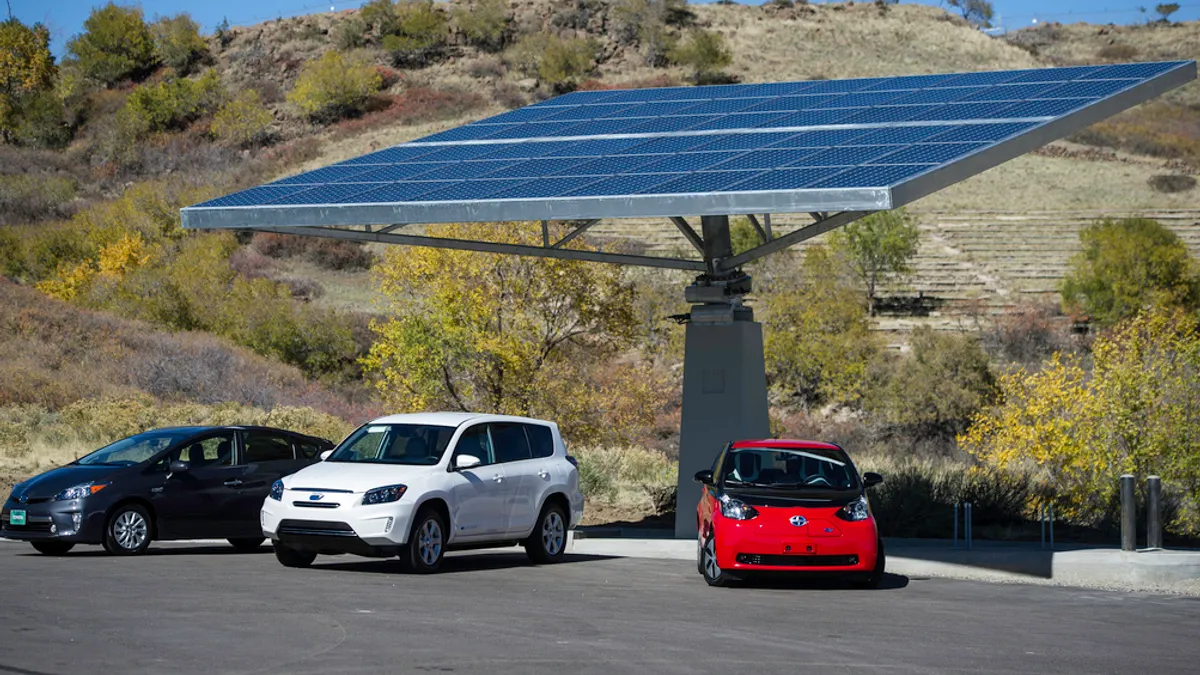UPDATE June 6, 2019: This post was updated with additional information on what the state's ZEV program will require.
Dive Brief:
-
Colorado is adopting a zero-emission vehicle (ZEV) rule, state officials announced Tuesday, despite automakers' push for a voluntary approach. The state is expected to model its rule after California's ZEV mandate.
-
The ZEV rules will require automakers in the state to sell a minimum mix of 7-9% electric vehicles, getting more credit for longer-range EVs, and ensure that every dealer has those models available, Simon Mui, senior scientist at the Natural Resources Defense Council's Climate and Clean Energy program.
-
Colorado environmentalists had opposed a voluntary approach to deploying ZEVs in the state, saying enforceable policies are more effective, while a group of automakers had claimed they could exceed what the mandates would require if there were a voluntary path.
Dive Insight:
The debate over whether flexible policy goals or more prescriptive mandates are more effective is often a key issue between business and environmental interests when it comes to energy-related rulemaking.
Businesses often complain that regulations can be cumbersome and impede their ability to compete, while green groups say that without clear requirements, environmental considerations may fall by the wayside.
"You kind of have something on the books that has some enforcement mechanism, or some teeth to it, to ensure that bad actors can't skirt what is considered a voluntary agreement," Sam Gilchrist, western campaigns director for the Natural Resources Defense Council (NRDC), told Utility Dive.
He said the automakers' assertion that they'd go beyond what the mandate would require if it wasn't in place "just doesn't make sense. I mean, if they want to go beyond the ZEV rule, 1) they would already be doing it, and 2) they wouldn't be worried about the ZEV rule being adopted because they would be going beyond that anyway."
A couple of automobile industry groups had been in discussions with state regulators over alternative policy options, but stakeholders were unable to reach a compromise.
"Unfortunately, while these discussions were encouraging, there were many complex details that we were unable to resolve," the Alliance of Automobile Manufacturers and the Association of Global Automakers said in a statement.
"Despite good faith efforts by all parties, we were unable to reach agreement on a voluntary approach that could be considered as a potential alternative to the zero emission vehicle (ZEV) standard," the executive directors of the Colorado Energy Office, Department of Transportation and Department of Public Health & Environment, said in a joint statement.
Colorado's announcement follows a number of other EV policy actions in the state.
In November 2018, the state adopted a low emission vehicle standard through the Air Quality Control Commission. And Colorado Gov. Jared Polis, D, has made EVs a key component of his administration's clean energy policy. His first executive order in office was aimed at advancing transportation electrification in the state and last week he signed four bills focused on electric vehicle policy.
The ZEV program is expected to be adopted in August, according to the NRDC, and will take effect in 2022, according to the state's energy, transport and environment agencies.















